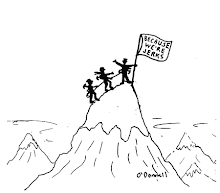It doesn't take that much energy to feel compassion for people, and it isn't a finite resource. That isn't the problem.
When I heard the term "compassion fatigue" in graduate school, I had a rare moment of living in the present. I filed it away and thought "when that happens, I'll deal with it." Oh, this isn't the thing I already talked about, by the way. It sounds like it's going to be the one about "the stories themselves aren't hard" but it's not. Variation on a theme mayhap.
What's exhausting and makes compassion (or even the ability to have people's stories penetrate through all the accreted formalist familiarity, come to speak of Jakobson) exhaustible is that you hear such a mix of compelling stories and, well, crap, that you begin to feel like the folks in the story who get all "yeah, yeah, we know this one: there's a wolf and it's going to fucking eat the sheep, you asshat."
This is a whole other topic: there are clients who, rightly or not, feel like they deserve our help more, because they seem to want it. So anyway if you see seven clients in a row who seem like anything you do will just sort of leave a soapy film of good intentions on their day and get washed off the next time they have the opportunity to commit larceny, you might do what I did which is to put off seeing someone who really wants help for like two weeks in which you could be writing them a good piece of advocacy.
To get there and to talk to him was to wonder if it's time to do something else for a while. I felt terrible. He gave what I like to refer to glibly as "good copy" which is to say he didn't tell me his story in stock phrases people use. You know these if your work is anything like mine. "Wrong place, wrong time." "Fell in with the wrong crowd." There are others I'll think of later. He also had gotten me a stack of medical records which eliminated one of the most numbing, I-am-in-a-Kafka-story moments of my job.
More importantly, though, he just didn't set off my bullshit detectors. I am sure they are sometimes calibrated wrong, and maybe he's a con man, and I don't mind that I'm sometimes going to make that mistake. But I feel reasonably certain, as certain as I get, that this guy wants to do something different and feels genuine regret about what got him where he is.
This was the guy I should have rushed to see. It's not important, because there's time, but it's dispiriting.
There's a little more to tell about tonight at the correctional facility lovingly known as The Tombs, but I'll post it tomorrow. The one thing that feels tackable-on is about doorknobbing, the process where a client (usually in therapy) asks a big question or makes a big reveal right as the session is over or a minute past over.
This was really bookending. At the beginning of the session, the guy tells me "I'm a man of faith. I thought about not coming down but then I thought, maybe it's that social worker, and I know you're here to help me get into a program. God is good." Or words to that effect. I don't begrudge people this, though I think it's not a good way to look at things, this "God capriciously chooses moments to make good things happen" theology, as featured on reality shows &c. I just ignore it and put it down to people getting through the day.*
But so the second bookend, it took me off guard. Very end of the interview, guard unlocking the door almost, he says "do you believe in god?" and I thought [sorry, this is going on really long for an afterthought]: I have a few options.
1) Do the old therapist's trick and say some formulaic crap along the lines of "It seems like you're curious about me. Do you imagine I believe in god?" This little act of emotional judo is supposed to facilitate transference, I guess, but I think it's at least half motivated by a wish for privacy and a need to arrange for it without asking for it directly. In any case, facilitating transference is 1a) useless and 1b) impossible when you meet with someone once or twice.
2) Do the old therapist's trick and say something a little more honestly evasive to the tune of "I can see why you'd be curious, but I don't think it's something that really relevant to what we're doing." Actually that one's not a trick. I respect that one.
3) Say "No, I don't" because the guy is an adult who has asked a question and there's little to be gained through options 1 and 2, and my need for people to know there are atheists in the world and sometimes they're the people who help you get out of jail (because religion may purport to be the source of all good intent, but it ain't) is irrelevant, and not valid to bring up on my own, but he asked. I didn't put it on my business card or anything, but now, if things work as they should, a devout person will know that non-believers are sometimes in your corner, failing to be purely evil.
So that's what I did, as you will have guessed.
*and, because I'm not a complete asshole, I leave room for the possibility I'm wrong about all of it. Just I don't think so is all.
Next up: the thing I saw on the wall. Oh, don't worry. It isn't a giant roach or anything.
Monday, May 3, 2010
Subscribe to:
Post Comments (Atom)

No comments:
Post a Comment